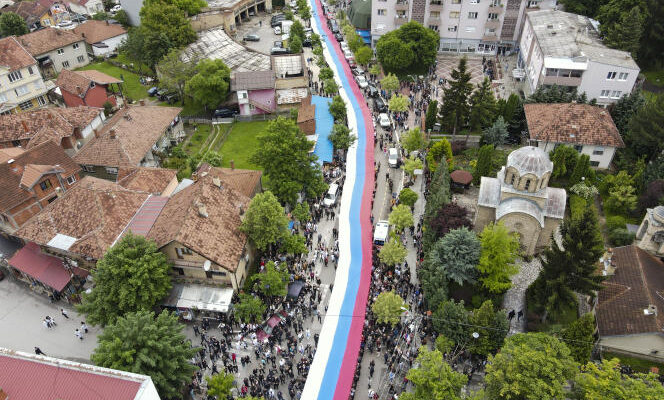For the past few days, the situation has been very tense in the region, which has been going from crisis to crisis for years. Like the day before, NATO peacekeepers stood guard on Wednesday, May 31, outside a town hall in northern Kosovo where hundreds of Serb demonstrators are gathered again after violent clashes widely condemned by Western powers. .
NATO has decided to send hundreds of reinforcements to the region to support the troops already deployed by the Kosovo Peacekeeping Force (KFOR) in the former province of Belgrade, after clashes in which thirty of his soldiers were wounded.
Hundreds of protesters gathered again on Wednesday morning in front of Zvecan town hall, heavily protected by KFOR soldiers. His troops surrounded the municipal building and reinforced the defense of the place with barbed wire and a metal barrier, reported a journalist from Agence France-Presse. The demonstrators, calm for the moment, unfurled a gigantic Serbian flag more than 200 meters long, between the city center and the surroundings of the town hall. They also hung Serbian flags on the metal barrier installed by KFOR.
In the four municipalities around Mitrovica where Serbs are the majority, many Serbs do not recognize Pristina’s authority and are loyal to Belgrade. The Serbs boycotted the April municipal elections in these localities, out of defiance towards Pristina, which resulted in the election of Albanian mayors with a turnout of less than 3.5%. Their enthronement, last week, by the Kosovar government set fire to the powder.
Unacceptable attacks
Three armored vehicles of the Kosovar police special forces, whose presence still arouses the ire of many Serbs, were parked in front of the town hall. The demonstrators demand the departure of the Albanian mayors, deemed “illegitimate”, as well as that of the Kosovo police.
On Monday, thirty KFOR soldiers were injured in clashes with Serb protesters, involving the throwing of Molotov cocktails and stones. Jens Stoltenberg, the Secretary General of NATO, denounced Tuesday in Oslo attacks “unacceptable” and accordingly announced the dispatch of reinforcements.
“We have decided to deploy an additional 700 soldiers from the Western Balkans Task Force Reserve Force and have put another reserve force battalion on high alert”he said. “Violence is setting Kosovo and the entire region back and jeopardizing Euro-Atlantic aspirations”he added during a press conference.
On the side of the protesters, Belgrade announced 52 injured.
Washington blames Pristina
Serbia, supported by its Russian and Chinese allies, has never recognized the independence proclaimed in 2008 by its former province, a decade after a deadly war between Serbian forces and Albanian independence rebels.
The European Union, which has mediated between the two former foes for a decade, has called on both sides to “defuse tensions immediately and unconditionally”.
The United States, historical allies of Kosovo, whose independence they have defended, have questioned the responsibility of the Kosovar Prime Minister, Albin Kurti, in the crisis. US Secretary of State Antony Blinken said his decision on inducting mayors had “strongly and unnecessarily aggravated tensions”. Washington also excluded Kosovo from a multinational military exercise program, its first sanction against Pristina.
The United States also threatens, in an unprecedented way, to end diplomatic support for the international recognition of the territory of the Balkans, recognized for the time being by a hundred countries.
The World App
The Morning of the World
Every morning, find our selection of 20 articles not to be missed
Download the app
The war in Kosovo, home to 1.8 million inhabitants, the vast majority of whom are Albanians, ended in 1999 with a NATO bombing campaign led by the United States. The Serbian minority has 120,000 members, of which about a third live in the north. Belgrade demands the application of a 2013 agreement providing for the creation of an association of ten municipalities with a Serb majority. But many Albanian Kosovars fear the creation of a parallel government controlled by Serbia.
